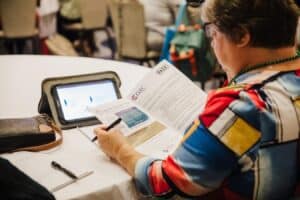
Below is a sampling of sessions that will address some of the issues you may experience in your program. Access the full list of educational sessions to learn more about the dozens of valuable learning opportunities.
The 4Cs of Clinical Readiness: Critical Thinking, Communication, Cultural Humility, and Core Competencies
Joanna Howard Ellis, MS, MLS(ASCP)CM, CHWI, Texas State University
This session describes a holistic approach to clinical readiness, which includes critical thinking exercises, social determinants of health, health disparities, communicating and acting with cultural humility, and the Student Laboratory Assessment Plan competency assessments (lovingly called SLAPs).
Adapting to Current Student Recruitment Trends
Julie Huynh, MPH, MLS(ASCP)CM, Loyola University Chicago
Kamran Mirza, MD, PhD, FASCP, MLS(ASCP), Michigan Medicine (University of Michigan)
Kristen Pesavento, EdD, MLS(ASCP)CM, Loyola University Chicago
COVID-19 has impacted the way we communicate and engage with prospective students. This session focuses on the importance of adapting new methods and strategies to engage student interest. Discussion of recruitment deliveries, flexibility, and marketing tactics to engage potential students will be included.
Competing with Your Local Hospital for Students
Maribeth Flaws, PhD, MLS(ASCP)CM, Rush University
With some hospitals hiring non-certified individuals for laboratory positions, programs may be struggling to maintain their viability. This session will discuss ways to address this, including demonstrating your value to your clinical sites by providing education to their non-certified employees.
Expanding the Role of the Advisory Board
Hassan Aziz, PhD, MLS(ASCP)CM, Texas A&M University – Corpus Christi
Peter Hu, PhD, MB(ASCP), The University of Texas MD Anderson Cancer Center
Yasmen Simonian, PhD, MLS(ASCP)CM, FASAHP, Weber State University
All programs are required to maintain an advisory board to meet accreditation standards. Most programs do not engage advisory boards as key components of successful development programs or to build the capacity to secure transformational gifts. This session will demonstrate additional ways to leverage advisory boards.
Implementing Reasonable Accommodations in an MLS Program
Janice Conway-Klaassen, PhD, MLS(ASCP)SM, FACSc, University of Minnesota
Christine Maleck, MS, MLS(ASCP), University of Minnesota
Programs are encountering many more students with disability accommodation needs. This session will review accommodations we received, and how we managed them, while maintaining the unique requirements of laboratory science program education.
 Integrating Generative Artificial Intelligence into the Classroom
Integrating Generative Artificial Intelligence into the Classroom
Kyle Riding, PhD, MLS(ASCP)CM, University of Central Florida
Generative artificial intelligence (AI) platforms have gained notoriety for concerns related to academic integrity. While these concerns are well-founded, it is important our community discuss opportunities and collaboratively identify ways AI can be integrated into the MLS classroom.
Simulation: Reducing the Burden on Clinical Affiliates
Nicole Dutton, PhD, M(ASCP), Gateway Technical College
Micheal Randolph, EdD, RMA(AMT), Gateway Technical College
Area clinical laboratories have a limited ability to place students for clinical rotations. In this presentation, we describe the development and implementation of a simulation laboratory that replaces nearly 50 percent of the clinical experience, reducing the burden on our clinical affiliates.
The Student Toolbox: Classroom Strategies to Enhance Students’ Study Skills, Exam Preparation, and Self Reflection
Stephanie Cochrane, EdD, MLS(ASCP)CM, Rutgers University School of Health Professions
With the goal of developing life-long learners, this session will provide tips and strategies to improve students’ study skills. From a pedagogical standpoint, emphasis will be placed on enhancing students’ use of effective study strategies.
When Virtual Reality Becomes Reality: Navigating the Past, Present, And Future of Virtual Reality and Artificial Intelligence
Kassi Erickson, EdD, MLS(ASCP)CM, South Dakota State University
April Nelsen, PhD, MLS(ASCP), South Dakota State University
This session will provide attendees an opportunity to try out the technological future of education through hands-on virtual reality (VR) and AI situations. Advantages and disadvantages of VR and AI will be discussed, as well as how the technologies can be used in the classroom or behind your desk.
Focus on Student Engagement Paired Presentation:
“Selfies, Scavenger Hunts, and Superheroes” or Increasing Student Engagement through Creative Learning Strategies
Amy Kapanka, MS, MLS(ASCP)SC, Hawkeye Community College
This session describes the benefits of integrating creativity projects into the intensive MLT and MLS curriculum. The integration of these projects to promote student engagement and motivation will be demonstrated. Students’ creativity projects will be clarified and illustrated.
Escape from the Tox Lab: A Clinical Toxicology Escape Room
Christopher Swartz, PhD, MLS(ASCP), University of Kentucky College of Health Sciences
This presentation describes the design and implementation of a clinical toxicology escape room activity for MLS students. It will also disclose data about the impact of the activity on toxicology education and student engagement.
CLEC 2024 will be held February 22-24 in Las Vegas, Nevada. Registrants have the option to attend in-person or virtually. Register by December 20 to get the early bird rate and save $100 off the onsite/late registration rate.

 Integrating Generative Artificial Intelligence into the Classroom
Integrating Generative Artificial Intelligence into the Classroom